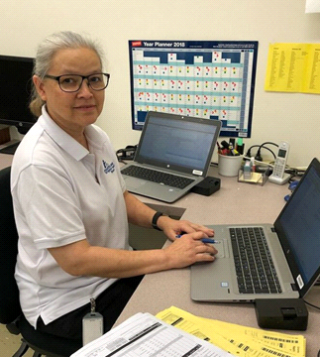- Home
- News
- Screening Matters, Issue 61, April 2018
- Auckland District Health Board's newborn hearing screeners turn super sleuths to find unscreened babies
News
- Screening Matters Newsletter
- April 2019
- April 2018
- December 2017
- August 2017
- April 2017
- December 2016
- October 2016
- March 2016
- November 2015
- August 2015
- June 2015
- April 2015
- February 2015
- December 2014
- October 2014
- August 2014
- June 2014
- April 2014
- February 2014
- December 2013
- October 2013
- August 2013
- June 2013
- April 2013
- February 2013
Screening Matters
The National Screening Unit newsletter
In this issue:
- Southern District Health Board ready to launch new bowel screening programme
- Hearty Hauora: Reaching Māori wahine in a new way
- Changes to the Health (National Cervical Screening Programme) Amendment Bill
- On time cervical screening improves coverage
- Auckland District Health Board's newborn hearing screeners turn super sleuths to find unscreened babies
- The National Screening Unit website is changing
- Communicating online via the Time to Screen Facebook page
Auckland District Health Board's newborn hearing screeners turn super sleuths to find unscreened babies

The Universal Newborn Hearing Screening and Early Intervention Programme aims to identify hearing loss early so babies can access medical and educational interventions which have been shown to significantly improve their long-term outcomes. To support this, the programme offers universal screening for all babies born in New Zealand, with the aim of completing screening by the time the baby is one month old.
Newborn hearing screening services focus on screening babies before they are discharged from hospital so families don’t have to return for an outpatient’s appointment. While the majority of babies are screened while they are still in hospital, this may not be possible if the baby was not born in hospital, transferred to another hospital or discharged to a birthing centre or home.
Auckland District Health Board offers a range of community outreach locations to make it as convenient as possible for families to access community based screening services. Locations are carefully chosen to be close to public transport, with easy parking access, and close to other community facilities which may also be accessed by parents/guardians/whānau. However, non-attendance remains a challenge. This is where the newborn hearing screening team go above and beyond their screening responsibilities and apply their detective skills to find babies and offer screening appointments.
Families come from far and wide to have their babies at Auckland District Health Board and the contact details for them are not always accurate. The team are resourceful in their searching for correct contact details. They explore all sorts of avenues to make contact with families including:
- calling GPs
- contacting midwives
- utilising social workers
- phoning extended family members
- using Māori, Pacific and Asian Support Service
- liaising with other district health board departments to locate up-to-date contact details.
Finding the correct contact details for the family is only part of the puzzle. The team also delivers a consumer focused service to minimise barriers to accessing newborn hearing screening. The team acknowledges that it is hard for some parents to attend appointments with a newborn, especially if they have other children, so they work with parents and whānau to find a time and place that is convenient and easy for them to have their baby screened.
Despite best efforts, in some cases attending a newborn hearing screening appointment remains a challenge for some parents and whānau and this is where the tenacious efforts of the Auckland District Health Board newborn hearing screening team really comes in to play. The team never gives up on any family that has indicated that they want to participate in screening and they continue to offer appointments at a range of times and locations. This includes home visits where it is proving just too difficult to attend a community based outpatient appointment. Parents and whanau have indicated that they are extremely grateful to the newborn hearing screening team for not giving up on them.
Kate Sheppley, the newest member of the team at Auckland District Health Board, says that she is immensely proud to be part of a dedicated team who go above and beyond to ensure that every baby has the opportunity to have a hearing screen to give them the best possible start in life.
To receive the Screening Matters newsletter by email, fill out our sign-up form.

